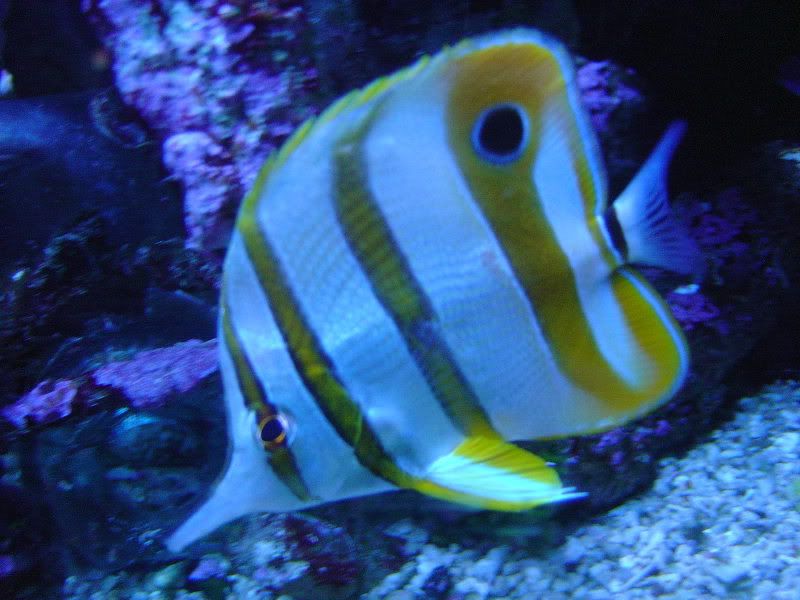Just because a fish does'nt show it doesnt mean something is'nt there. Could be immune to the disease,then it goes into your tank affects your other fish differently.......
Here is a copy of what is done to the fish.This is from a local vet that does this. I dont in anyway take credit for this. i'm just trying to share information
Treating fish in quarantine is as much an art as a science, and therefore, there is no one "cook-book" set of instructions as how to do this. I will explain a typical protocol that I use, but keep in mind that there are occasions when I might vary the technique, determined by many variables. (For example, if I get a shipment of tank-raised fish from ORA, I may reduce the dosage and length of time for each drug. (It is very unlikely that these fish will be carrying parasites, but you never know. ORA does introduce wild-caught fish into their breeding program from time-to-time. But still, the overall length of the quarantine/observation period will still be 4-5 weeks.)
When I was treating fish in the past, as a hobbiest (i.e. treating a small number of fish, infrequently), I found the biggest problem was keeping a biological filter active. It is beyond the scope of this thread to explain this in detail, but please keep this in mind, and consider testing for at least nitrites (and possibly ammonia) on a daily basis.
DISCLAIMERS: I don't profess to be an expert in the use of any of the drugs or protocol that I am presenting. My system is the result of a lot of research and trial-and-error over the past 40+ years. My purpose for this thread is to simply present to others my methods, which work very well for me, rather than to recommend that others use this technique. As with the use of any drug, undesirable effects can result, including death. I use 30 gal, bare-bottom tanks with PVC pipe pieces for hiding places. A stand pipe skims water from the surface to a 15 gal sump, 2/3 filled with mini bio-balls. (A float valve is used for RO/DI water evaporation replacement). Tanks are maintained in a dimly lighted room. Each tank has a UV sterilizer.
PROTOCOL
Upon arrival of a shipment of fish, I acclimate them for about 2-3 hours
with no dips or drugs. I like to leave them in quarantine tanks with no treatment for a few days until I see fish eating. (Of course, if I detect any parasites, visually or via necropsy/microscopic exam, I will start the proper medicine immediately).
1.
CHLOROQUINE PHOSPHATE 250 MG TABLETS (This drug is for protozoa; I suspect it is good for internal as well as external protozoan parasites). One tablet per 10 gallons (generally, one dosing). A 20% water change is made after the first week, and again after the second week. At end of 3d week, a 50% water change followed by carbon and Polyfilter in sump for 3-4 days. During the 3-week period, I generally do NOT add more drug at each water change, UNLESS I know a fish has protozoa. I'm sure there might be some controversy with the use of this drug. Some say it only causes the parasite to fall off fish. I don't know for sure, and I don't know if it is good for ALL protozoa, but
IME it seems to kill them all.
2.
PRAZIQUANTEL I use PraziPro (Hikari) at a dosage of 2.5 ml per 10 gallons, one time for 5 days. Then, a 50% water change; and, carbon/Polyfilter. This drug kills trematodes (flatworms) and tapeworms. It is a wonderful drug and am I glad to see it on the market! Years ago we only had a dog/cat tapeworm medicine (Droncit) that cost about $5 to treat 1 quart!! (Sea World had to treat a large tank for trematodes with Droncit which cost them over $250,000!!)
3.
LEVAMISOLE (powder) I mix this powder into my gel-food formulation that I make for my fish, at the rate of 4 grams per Kg (2.2 lbs) of food. (This can be scaled down, e.g. 400mg/100 gm food. This is fed once a week for 3 weeks, DURING the last 3 weeks of quarantine. This medicine is for intestinal roundworms of various types. (There was a time, especially when I stocked my 500 gal tank, when I use to collect feces from individual fish for microscopic examination. You would be surprised at how often I would find various types of intestinal parasites. They are like worms in dogs and cats....best to get rid of them...the fish have enough stress in their lives!
On rare occassions, I will treat with an organophosphate (for arthropods, usually isopods) but only if I find some on a live or dead fish. One should suspect isopods if you see fish gasping (although there are other causes for this). A freshwater dip for 3 minutes usually brings instant relief, but of course the tank needs to be treated. With magnification, you can easily see the dead isopods on the bottom of the container used for the dip. (If interested, I can send you a photo of the isopod that I sometimes find...unless I can figure out how to post the photo here!)

NOTE: Mandarins cannot survive this treatment unless live food is provided. Fortunately, they rarely succumb to parasites. I generally leave them in the quarantine tank with Chloroquine for 24 hours, followed by a 1-hour dip in praziquantel. I then put them in a refugium for a couple of weeks. Once I am sure they are eating and seem OK, I then offer them for sale. (I know I am taking a slight chance by skipping the "usual" treatment, but so far I have never seen parasites on a mandarin after this modified procedure, nor do I have any reason to think they have ever transmitted parasites to other fish.)
Hope this helps.








